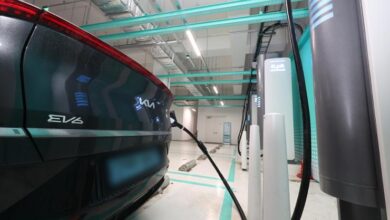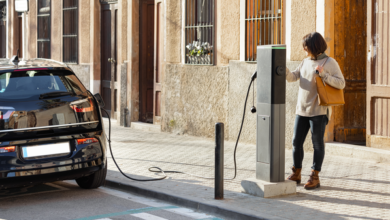Electric cars not yet the popular choice among Canadians: survey

As scientists warn that the world needs to transition away from fossil fuels to limit climate change, Canadians are still lukewarm on electric vehicles, according to a survey conducted by Nanos Research for CTV News.
Nanos surveyed 1,086 Canadians between April 28 and May 1 to gauge their level of support for a hypothetical ban on the use of gas-powered cars and SUVs as of 2035, their feelings about green energy incentives, their level of confidence that Canada will have enough charging infrastructure in the future and their level of interest in owning an electric vehicle.
The survey found Canadians were almost four times more likely to oppose, rather than support, a total ban on the use of gas-powered vehicles as of 2035.
“Opposition is higher among residents of Atlantic Canada, the Prairies and British Columbia compared to Quebec,” the study reads.
The results come months after federal Environment Minister Steven Guilbeault finalized new regulations mandating the transition to battery-operated cars, trucks and SUVs.
Automakers will have the next 12 years to phase out combustion engine cars, trucks and SUVs, and to gradually increase the proportion of electric models they manufacture.
The move fulfills a promise the Liberals made in 2021 to phase out the sale of gas-powered passenger vehicles by 2035, but it is not a total ban on the use of combustion engine vehicles. Gas-powered models sold before 2035 will be allowed to remain on the roads.
Incentives, infrastructure and ownership
When it comes to green energy incentives, 72 per cent of respondents support or somewhat support incentives for Canadians to use alternative energy sources for home and travel. This figure is consistent with findings from 2023, but remains lower than in 2016. Support is higher in Quebec (81 per cent) and Ontario (72 per cent) than in the Prairies (63 per cent).
Enthusiastic as they are about clean energy incentives, Canadians are much less optimistic about the likelihood Canada will have enough charging infrastructure in the future to support the increasing number of electric cars.
In fact, two-thirds of survey respondents, or 66 per cent, are not confident or somewhat not confident Canada will have the necessary infrastructure in place. Once again, Quebecers expressed the most optimism in this area than respondents in other parts of the country.
Finally, fewer survey respondents are interested in owning an electric car now than in 2022 and 2021. Just over half are interested (21 per cent) or somewhat interested (33 per cent), representing an 11-percentage-point decline in outright interest from 2022, when 32 per cent interested.
Quebec residents are more likely to be interested or somewhat interested in owning an electric vehicle than respondents in the Prairies or Atlantic Canada. The study did not state why Canadians’ attitudes toward electric vehicles may have changed.
Methodology
Nanos conducted an RDD dual frame (land- and cell-lines) hybrid telephone and online random survey of 1,086 Canadians, 18 years of age or older, between April 28 to May 1, 2024 as part of an omnibus survey. Participants were randomly recruited by telephone using live agents and administered a survey online. The sample included both land- and cell-lines across Canada. The results were statistically checked and weighted by age and gender using the latest Census information and the sample is geographically stratified to be representative of Canada.
Individuals randomly called using random digit dialing with a maximum of five call backs. The margin of error for this survey is ±3.0 percentage points, 19 times out of 20. Charts may not add up to 100 due to rounding.
With files from The Canadian Press



